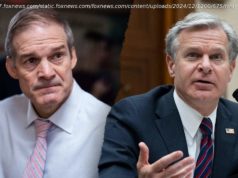A Justice Department official confirmed that the deputy attorney general planned to accompany the president as he travels to give a speech in Florida, but did not share an agenda for any meeting.
WASHINGTON — Rod J. Rosenstein, the deputy attorney general, and President Trump planned to travel to Florida together on Air Force One Monday morning, a week and a half after the two were scheduled to discuss remarks Mr. Rosenstein had made about the president’s fitness for office and an offer to secretly tape conversations with him.
The two men were scheduled to leave for Orlando, where Mr. Trump is to deliver a speech at the International Association of Chiefs of Police annual conference in the early afternoon.
A Justice Department official confirmed that the Mr. Rosenstein planned to travel on Air Force One to accompany the president for his speech, but did not share an agenda for any meeting.
Presumably, Mr. Rosenstein and Mr. Trump will use their time on board to discuss the fact that the deputy attorney general had offered to secretly tape his conversations with Mr. Trump in the chaotic days after the president fired James B. Comey, the F. B. I. director, in the spring of 2017. At that time, Mr. Rosenstein also brought up the possibility of invoking the 25th amendment to remove Mr. Trump from the White House.
[Read: Rod Rosenstein Suggested Secretly Recording Trump and Discussed 25th Amendment]
Disclosure of those conversations thrust Mr. Rosenstein’s future at the Justice Department into doubt. In the days following those revelations, first published Sept. 21 in The New York Times,Mr. Rosenstein told senior White House officials, including John F. Kelly, Mr. Trump’s chief of staff, that he wished to resign.
But Mr. Rosenstein’s offer to quit came while the White House and the president were preoccupied with the fight to confirm Judge Brett M. Kavanaugh to the Supreme Court, and the White House delayed the discussion.
Ultimately, a planned meeting in late September between Mr. Rosenstein and Mr. Trump was canceled. No new date was announced for a time when the two men would discuss Mr. Rosenstein’s comments and his future at the Justice Department.
During a news conference at the United Nations General Assembly, Mr. Trump said that he did not want to fire Mr. Rosenstein, who had denied the reports that he had been willing to secretly tape the president.
“We’ve had a good talk,” Mr. Trump said. “He says he never said it, he doesn’t believe it, he said he has a lot of respect for me, and he was very nice, and we’ll see.”
Mr. Trump had said that the two men did not want to do anything to interfere with Judge Kavanaugh’s confirmation hearing. And Kellyanne Conway, a counselor to the president, said during a televised interview that the two men “are both committed to speaking with each other and resolving this once and for all.”
Should Mr. Rosenstein quit or be fired from the Justice Department, his departure could fuel public rancor going into November’s midterm elections, which have been consumed by anger and jubilation over Judge Kavanaugh’s confirmation.
Mr. Rosenstein is the top Justice Department official overseeing Robert S. Mueller III, the special counsel who is investigating whether the Trump campaign worked with Russia to sway the 2016 election.
That position has made Mr. Rosenstein the protector of the Mueller investigation, and sometimes the target of Mr. Trump’s attacks on what he calls a politically motivated witch hunt.






